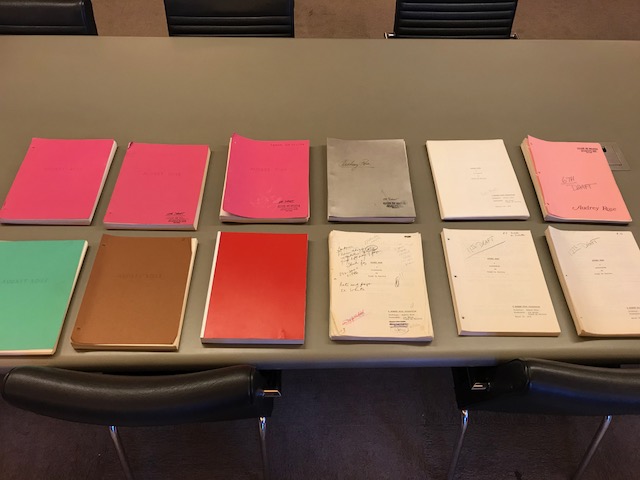Halloween Script Cavalcade: Audrey Rose
One of the great pleasures of working in a script archive and library is being exposed to storytelling outside of one’s typical genre or wheelhouse. Because I don’t like getting unnecessarily freaked out, one genre I tend to steer clear of is occult-based horror. At the beginning of this week, I was tasked with processing the archival papers of writer Frank De Felitta. Because De Felitta wrote mostly on spooky, supernatural subjects, the prospect of diving into this script collection scared the hell out of me.
I’m writing this blog post not just because it’s Halloween and I want to brag about conquering my fears, but mostly because I want to emphasize how important it is to look at scripts and brush shoulders with topics outside of your storytelling comfort zone. Even if you write emotional, character-based comedies, you can still learn something from the suspense and curiosity inherent to horror. Just as if you write explosive action stories, it’s important to take in a romance every so often because it’s a genre that can help you to understand character growth.
When you’re developing your ever-evolving story sense, all genres and narrative devices are useful.
Born in 1921, Frank De Felitta became known for his novels as well as his screen and teleplays, mostly during the 1960s and 70s. He’s a rare horror writer who, on several occasions, adapted his best-selling novels into films. Notable examples of this are Audrey Rose (Novel: 1974, Film: 1977) and The Entity (Novel: 1978, Film: 1981). De Felitta’s papers—now housed here at the WGF—include original manuscripts for his novels and then later drafts of his adapted screenplays.
While processing this collection, I became particularly intrigued by Audrey Rose. A best-selling novel in 1974, it tells the story of a couple, Bill and Janice Templeton, who are confronted by a man confident that their daughter Ivy is the reincarnation of his deceased child, Audrey Rose.
On Mondays, when the library is closed to the public, we pull out the contents of dozens of unprocessed boxes (most of which are donated by the writers themselves or their families) and lay them out on our long table to organize them and make them accessible. Pouring through the De Felitta papers, which were recently donated by Frank's son Ray De Felitta, I found the original book manuscript for Audrey Rose, then 12 drafts of the screenplay.
Processing collections from before the heyday of computers is always interesting because you can see before your very eyes and hold in your hands the labor that went into writing a particular project. Even though De Felitta adapted novels that he himself wrote, it still took him 12 drafts to get Audrey Rose right. It proves writing is hard.
When processing collections, sometimes it’s the thoughts and concepts you come across that really stick with you. I call it “accidental research.” You learn something from looking at a script you might have been afraid to look at and you end up with a seed of inquisitiveness that keeps you doing further contemplation or investigation on your own.
From folder-ing Audrey Rose scripts, I’ve become fascinated with the idea of previous lives and reincarnation. Regardless of one’s chosen genre(s) or writing style, the notion of “previous lives” can be very helpful for a writer.
When we take in a story, oftentimes we respond emotionally to the subtext, the subconscious and the things which are going on underneath the narrative that unfolds before our eyes. How useful it is, then, for a writer to consider a character’s previous life when determining their behavior and choices in the present. Maybe the reason we connect with certain people in our waking, day-to-day interactions is because we knew them in a previous existence and our souls still know each other.
You know how some people can’t explain their weird abilities or their night terrors? Maybe it’s a previous life.
I don’t write horror or explore the supernatural in my own writing, but I think considering the previous lives of our characters is a great way to write subtext and navigate the subconscious. For your further rumination, I’ll leave you with this pivotal scene from the first draft of the Audrey Rose screenplay. Ivy Templeton suffers from excruciating, worsening spells, where she seems to enter an altered state. Elliot Hoover, who is convinced the soul of his deceased daughter, Audrey, has been reborn in Ivy, is the only person who is able to calm her down.
More drafts and information on Audrey Rose and many more of Frank De Felitta’s books and screenplays can be found in our archives. Browse the collections here – and always consider that you might find more to inspire you when encountering something outside your specific area of interest.
Happy Halloween!









